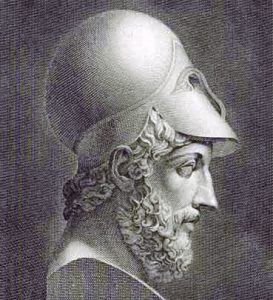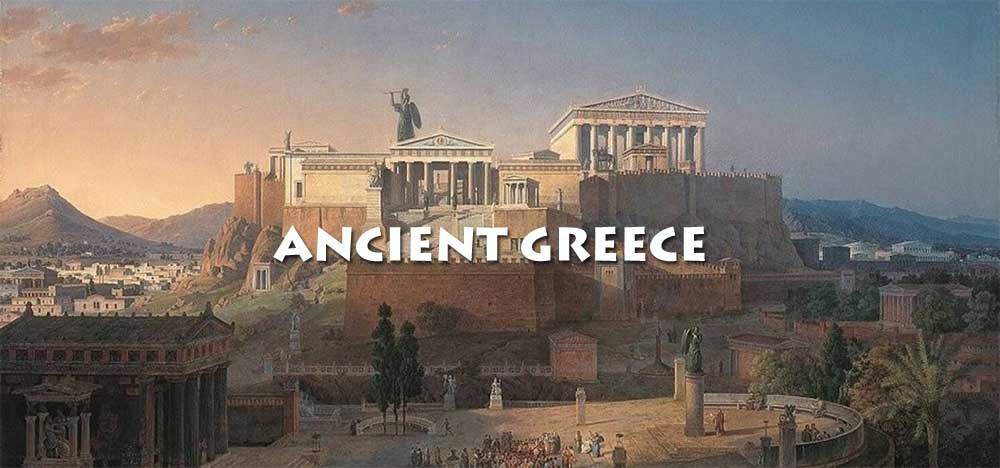Who was Pericles in Ancient Greece

Pericles (c.495-429), was the most renowned statesman in Greek history, Pericles was the offspring of the military leader Xanthippus, who triumphed over the Persians at the Battle of Mycale in 479 BC. His mother, Agaristis, came from the family of Cleisthenes.
He was a student of several prominent figures, including the Sophist and musician Damon and the philosophers Anaxagoras, and Zenon of Elea.
Pericles is the most brilliant political personality of ancient Greece who managed to change the face of Athens both in its political path and in its intellectual and artistic path, and to give the city of Athens the Gold of the Century.
Being a descendant of the Acamandian tribe, Pericles managed to get an excellent education. His teachers were Anaxagoras, Zeno the Eleatic and Damon.
With them, Pericles cultivated his spirit and opened his horizons while training his judgment in everything that until then may have seemed difficult and incomprehensible to most, while the cultivation of his spirit gave him unlimited composure and courage.
The latter characteristics are highlighted through the incident of the unknown man who began to curse Pericles. The man followed him throughout the day, even reaching outside his house. Despite all this, Pericles did not respond to the heavy accusations, but on the contrary, when darkness fell, he instructed one of his servants to escort the abuser to his safe house.
His great gift was none other than his eloquence and rhetorical skill. The Athenians stood spellbound by his speeches. He did not have to try hard to convince his audience as his calmness and clear meaning against the wooden rhetoric of his opponents was enough to win the favor of his audience. Many described him as strong, but Pericles’ true strength was not only physical but mostly spiritual.
Distinguished for his dignity, eloquence, integrity, and patriotism, Pericles gained the respect of Athenians. His circle of friends included notable personalities like Sophocles, Herodotus, Phidias, Socrates, and Protagoras.
Pericles was known for his powerful rhetoric, often described as having “thunder and lightning on his tongue.” Even though he hailed from an aristocratic family, he emerged as the leader of the populist party.
His consort was the intelligent and stunning Aspasia, who later became his wife. They would frequently host gatherings of intellectuals and their spouses at their home.
In his role as an Athenian statesman, Pericles ardently advocated for democracy. He pushed for all Athenian citizens to be politically active and was the first to compensate state servants.
Council members were chosen by all Athenians, and Pericles was instrumental in the restoration and construction of many structures, including the Parthenon on the Acropolis, employing the city’s poorest citizens.
Pericles invested considerable sums in enhancing Athens. He hired the artist Phidias to create numerous exquisite artworks.
The Parthenon was designed by Iktinos and Kallikrates, while Mnesikles worked on the Propylaea of the Acropolis. Among the most costly and spectacular works was the gold and ivory statue of Athena.
Pericles also revamped the port of Piraeus and completed the fortifications of Themistocles and Cimon with the long walls, linking Athens with Piraeus.
Under his reign, Athens evolved into the commercial, intellectual, and artistic hub of Hellenism, justifying the label of this era as the Golden Age.
After ostracizing the aristocratic leader Cimon, Pericles emerged as the premier leader of Athens for 15 years. With Pericles as leader, Athens transformed into the most splendid Greek city-state both politically and culturally, boasting its fleet, forming alliances with other city-states in the Delian League against Persia, and fostering arts and literature.
However, this led to fear and jealousy among other states, triggering the Peloponnesian war in 431 BC. Pericles allowed all inhabitants of Attica to seek refuge in Athens but was himself accused and fined for misappropriation of public funds.
He was re-elected, but his life was cut short by the plague that ravaged the densely populated and malnourished city, also claiming the lives of his two sons.
Initially, Pericles’ adversaries targeted his friends, fearing direct confrontation. For instance, they accused the sculptor Phidias of embezzlement and charged Anaxagoras with impiety.
His engagement with the commons first took place in 472 BC when he undertook the sponsorship of a trilogy by Aeschylus, while later, although he belonged to an aristocratic generation, he joined the political faction of the democrats who at that time had Ephialtes as their leader.
Pericles was particularly active and active politically. He believed that being in politics should have as his main goal the common good of the Athenian citizens. In fact, he was the one who accused the oligarch Cimon of involving Athens in the Messinian War, with the result that Cimon was exiled from Athens and the democrats prevailed in the city.
Pericles soon became the next leader of the republics, winning the favor of most of the Athenians, who honored him by electing him general for consecutive years. His assumption of the leadership of the city has gone down in history as the Golden Age of Pericles. His honesty and the sharpness that characterized him gave Athens its most creative and productive years that changed the course of the history of the Greeks, reaching their current form after successive socio-political ferments.
Pericles achievements
Pericles was a multifaceted individual, known for his roles as a general, politician, orator, and scholar. His leadership marked the Golden Age of Athens, a time when the arts prospered. Pericles presided over Athens beginning around 461 BC.
A masterful politician, he was a living representation of Greek democratic principles, and he held the longest tenure as the city’s leader until he succumbed to the plague in 429 BC.
Pericles aimed to make Athens the cradle of democracy and civilization and he succeeded even in those difficult periods dominated by the power of war. In relation to the strengthening of democratic institutions and the suppression of inequalities and the exploitation of power by the few, he proceeded with a series of reforms.
Pericles expanded the jurisdictions of the Church of the Municipality and the Court of Iliaia while at the same time reducing the powers of the Supreme Court which operated in favor of the oligarchs.
Pericles established the institution of ‘salary’ in order to strengthen the weaker social groups, while he proceeded to select lords by lottery so that not only the rich and influential in the city would take up such positions, but that all Athenian citizens would have equal opportunities.
He believed that in this way the worthy would stand out by placing as their main concern the protection and common good of the city.
At the same time, he helped the needy by sharing whatever money was left over from the public treasury while he also established the famous ‘Theoretic’ to enable the poorest to attend the theater and be genuinely entertained.
In addition, he distributed land to the landless in regions and cities with which Athens was allied, thus helping the landless to improve their lives.
However, Pericles did not only consolidate the democratic institutions but promoted a unique spiritual flourishing as during his days he rebuilt as many works of art as well as temples he could. The rebuilding of the Parthenon after the destruction it had suffered from the Persians was his own initiative, while Phidias supervised the work in collaboration with Iktinos and Kallikrates.
Athens became a city of arts and spirit and many arts and orators, poets and painters chose it as the seat of their activities. In fact, valuable help for Pericles in this part was also his wife Aspasia, who loved the arts and had significant artistic training.
The Parthenon, a temple on the Acropolis and one of ancient Greece’s most iconic structures, was built under Pericles’ direction. Like many other edifices on the hill, it stands as a testament to the height of Athenian power, but it’s most closely associated with the influential leader who championed its construction.
Fortification of Athenian democracy
Pericles is historically recognized as a powerful orator, renowned for his speeches promoting democratic values. During one of his addresses in the Peloponnesian War, he famously stated: “Our form of government does not enter into rivalry with the institutions of others. Our government does not copy our neighbors’, but is an example to them. It is true that we are called a democracy, for the administration is in the hands of the many and not of the few.”
From the onset of his public career, Pericles was a staunch supporter of theatrical performances. In 472 BC, he sponsored Aeschylus’ Persians. Later, in a bid to bolster Athenian culture, he leveraged state resources to subsidize theater tickets for the city’s poorer citizens, thereby making theater accessible to all.
Pericles and the Athenian Empire
Under his leadership, Athens emerged as the dominant member of the Delian League, an alliance of several hundred Greek city-states set up as a bulwark against the invading Persian forces. This alliance gradually morphed into the Athenian Empire, which expanded its influence across the Mediterranean by funding the establishment of colonies, including Thurii in Italy.
The popularity of Pericles enabled him to easily side-line his political rivals, whom he often ostracized. Despite allegations of corruption and tyrannical behaviors, his political clout was so substantial that during his tenure, he was only temporarily unseated once.
The end of the Golden Age of Pericles
The end of the Golden Age of Pericles is marked by the beginning of the Peloponnesian War. In 431 BC when Archidamus of Sparta marches against Athens and destroys everything in his path, Pericles decides that it would be wiser to face him at sea rather than on land where the Spartans had the upper hand.
In the year that followed, the war had become general and Athens mourned its first dead. Then Pericles uttered the famous ‘Epitaph’, highlighting his rhetorical gift.
However, the plague struck the city of Athens as a large number of Athenians were locked inside the walls, with the result that many Athenians perished among them and Pericles’ sister and two children, while he too became seriously ill.
The Athenians in the midst of the war put part of the blame on their leader, accusing him of their sufferings, but Pericles managed to overturn the accusations in court even though he had lost the trust of the people who did not re-elect him to the leadership of the city.
In time, he regained the people and his position, but the disease that had struck him from the plague was fatal for his life.
Pericles death
Pericle died in 429 BC during the second year of the Peloponnesian War. His death was the result of a plague that devastated Athens. This plague, which historians believe may have been typhoid fever, killed a significant portion of the city’s population.
The death of Pericles marked the end of the city’s Golden Age. He had been a driving force behind Athens’ transformation into a hub of learning, arts, and democracy, and his leadership style had kept the city unified. His loss was a significant blow to the city, both symbolically and politically.
Without his moderating influence, the war between Athens and Sparta became more bitter and protracted. The war ended in 404 BC with the defeat of Athens, which marked the end of the city’s dominance in the Greek world.
Interestingly, Pericles’ death was not the end of his family’s political influence. His sons predeceased him due to the plague, but his nephew, Alcibiades, went on to become a significant, albeit controversial, figure in Athenian and Spartan politics.
Pericles was a true leader, being an honest and methodical politician who aimed to get the best out of his people without ever using his rhetorical skill to deceive but only to help and serve the citizens of Athens.
